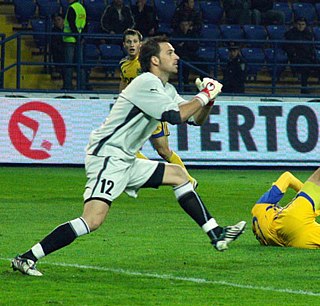
The Albania national football team represents Albania in men's international football. It is governed by the Albanian Football Association (FSHF), the governing body for football in Albania. It is a member of UEFA in Europe and FIFA in global competitions. The team's colours reference two national symbols: the double-headed eagle and the country's tricolor. Their supporters are colloquially referred to as the Tifozët Kuq e Zi.
Sport in Albania revolves mostly around team sports, such as football, basketball, volleyball and handball. Other sports includes boxing, weightlifting, tennis, swimming, judo, karate, athletics, table tennis, badminton, rugby, cricket, and chess. Football in particular has seen a rapid transformation, with the Albania national football team making its debut at the 1964 UEFA European Football Championship. The national football team also qualified for the 2016 UEFA European Football Championship. Many Albanian athletes have also achieved significant success and have won European and Mediterranean titles in numerous sports during the years, such as wrestling, football, athletics and weightlifting. Albanian athletes have won a total 49 medals for Albania in 8 different Mediterranean sports.

Altin Dodë Lala is an Albanian former professional footballer, who played as a defensive midfielder, and former manager. He spent his entire playing career in Germany and represented the Albania national team.

Jahmir Hyka is an Albanian retired professional footballer who played as a left midfielder.
Erjon Bogdani is an Albanian professional football coach and former player. He is nicknamed "Bogu" or "Er-Bomber".

Ansi Agolli is an Albanian former professional footballer who captained the Albania national team. He played primarily as a left back or left midfielder, but he also operated as a right-back. Prior to March 2019, he was attached to Qarabağ in the Azerbaijan Premier League.

Edmond Kapllani is an Albanian former professional footballer who played as a forward.

Hamdi Abdullah Salihi is an Albanian retired professional footballer who played as a forward. He is the assistant manager of Albania.

Isli Hidi is a former Albanian professional footballer who played as a goalkeeper.
Alban Bushi is an Albanian professional football coach and former player who is the manager of Albania under-21 and under-20 team. He is nicknamed "Loku".

Ervin Bulku is an Albanian former professional footballer.

Football is the most popular sport in Albania, both at a participatory and spectator level. The sport is governed by the Football Association of Albania (FSHF).
Daniel Xhafaj is an Albanian retired professional footballer. Mainly as a striker, he could also play as second striker.

The Albania women's national football team represents the country of Albania in international football and is controlled by the Albanian Football Association which is headquartered in the city of Tirana. The team is affiliated with UEFA and competes in the two major professional tournaments, the FIFA World Cup and the UEFA European Championship.

Mërgim Mustafë Mavraj is a former professional footballer who played as a centre-back. Born in Germany, he represented the Albania national team from 2012 until 2020. Mavraj previously played for Germany U21 team, as well as spending his professional career in Germany, his place of birth, from 2005 to 2018 and again from 2019.
Gentian Selmani is an Albanian professional footballer who plays as a goalkeeper for Albanian club Tirana and the Albania national football team.
The history of the Albania national football team dates back to the team's formation and first ever international match in 1946.
The following is a list of the Albania national football team's competitive records and statistics. The page is updated where necessary after each Albania match, and is correct as of 14 October 2024.
Mirlind Daku is a professional footballer who plays as a forward for Russian Premier League club Rubin Kazan. At international level, he played for the Kosovo national team in 2020 and 2021, before switching his national allegiance to Albania in 2023.
Altin Bytyçi is a Kosovan professional footballer who plays as a centre-back for Albanian club Partizani Tirana.









